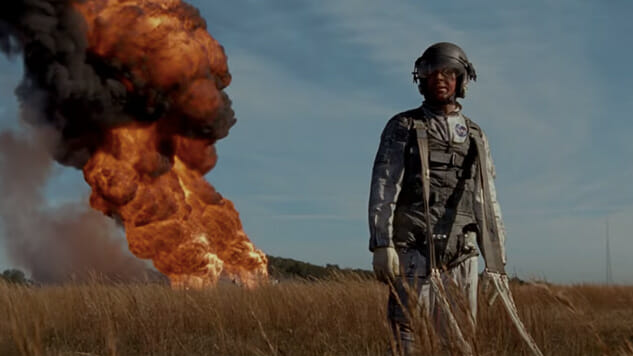First Man, Last Chance
In 2018, even our most escapist art has ecological apocalypse built into its DNA.

Early in First Man, astronaut-to-be Neil Armstrong (Ryan Gosling) sits before a NASA panel, fielding questions from an assortment of crag-jawed (white) bureaucrats, each scientist and obligatory government official unable to cut through the stolid man’s unflappable demeanor. Once they’ve sorted out Armstrong’s impressive engineering know-how, two questions remain. The first is macroscopic: Why should the United States, or any country for that matter, explore space at all? Armstrong answers that such missions—such ambitious pursuits—afford the human race a massive shift in perspective necessary to comprehend the progress, or lack thereof, in this project we’ve called civilization. The second question, by comparison, is small. Personal. Would the recent death of Armstrong’s four-year-old daughter affect his performance? It would be “unreasonable” to assume that it wouldn’t, he replies.
Director Damien Chazelle wisely foregrounds Armstrong’s quest to the Moon with that death, with opening scenes of Armstrong with his young daughter, singing to her and consoling her after she vomits, helpless to both “solve” the problem of her malignant brain tumor and, after she’s passed, process the grief. He escapes, instead, into his work as an aerospace engineer, and then jumps—as actively as such a serious-minded man could jump—into the chance to escape the planet’s atmosphere. The question about his daughter may be rude, but it’s still valid: A man shouldn’t go into space because he’s running away from his life on Earth.
First Man attempts to get into the head of a man like Neil Armstrong, a man who smuggled in that head a vibrantly painful memory of his daughter all the way to the surface of, as Kyle Chandler’s Deke Slayton writes in block letters on a chalkboard, the “MOON.” Throughout, the film rarely leaves the cockpit of the spaceships carrying that man and that head, approximating in vivid, visceral, even technical detail the sensory experience of riding a stick of dynamite through all borders of the known frontier.
The film concludes, of course, on the breathtaking sequence of the lunar landing, but rather than explore how the world changed at that moment, Chazelle stays inside Armstrong, using the grandeur of what the man’s accomplished to reflect on how such an experience would impact his continuing, silent grief. Both obliquely and literally, Chazelle (with screenwriter Josh Singer) dramatizes that shift in perspective Armstong alluded to back before he actually became an astronaut. The man glimpses his insignificance there, on the surface of the Moon, the Earth a bauble in all that black. His pain is little more than a fleck; his life and that of his lost daughter a momentary nothing in the overwhelming everything of the cosmic plan. The death of his daughter more than affected his accomplishment, it pushed him to the outskirts of all that he knows.
And then Neil Armstrong returns to Earth, as he must. He returns to his family and to his wife (Claire Foy, who, unlike Gosling, seems to understand that repressed emotions need not mean a face as voided as a blank slate). Likewise, Chazelle offers a fleeting sense of protests at the time, dropping snippets of Gil Scott-Heron’s “Whitey on the Moon” accompanied by news-like interviews with citizens wondering why we’d set our expensive sights on outer space when so much inequity and injustice and brokenness thrives on terra firma. The director doesn’t so much argue with such valid protests as he just moves on from them, not because he disagrees but because—for better or worse—Neil Armstrong doesn’t even seem to notice that they exist. So concerned with “could,” Armstrong (and the film) never stops to to truly wrestle with if we “should.”
Within the past week, we’ve had to confront the same urges to get up and move. We’re coming to terms with our generation’s failures at the same time as we must accept more impending failure, lest we do something now. Right now. We have barely a decade before many parts of the planet become irrevocably uninhabitable, and even then, change must begin without delay, despite however casually our government denies reality. For most of us, the news speaks of hopelessness, of the individual helpless to make any difference in the face of astounding odds. Even news articles which attempt to recontextualize global doom as basic (but drastic) steps every family must take to do our part—and other tone-deaf malarky—fails to provide sufficient weight to the real villains of sustainability, namely massive corporations, who contribute more than 70% of the total greenhouse gases choking the life out of our planet. Cutting back by 30% on animal products isn’t going to do shit about tragic hurricanes being the new normal.